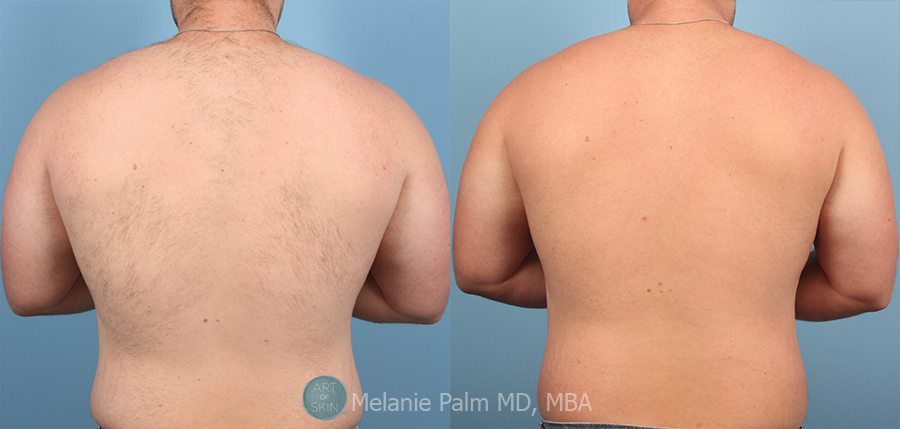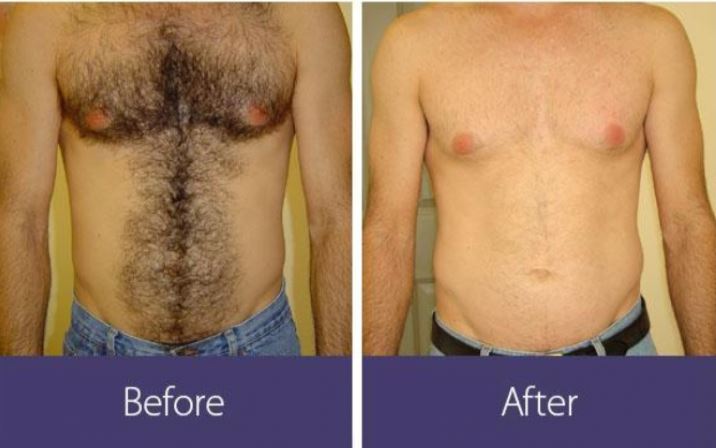Does Laser Hair Removal Reduce Sweating? Exploring the Link Between Laser Hair Removal and Sweat Production

Sweating is a natural bodily function, but for many of us, it can become an unwelcome and embarrassing inconvenience. Whether it's excessive perspiration during a nerve-wracking presentation at work or the discomfort of constantly battling underarm wetness, finding effective ways to manage this issue is a common concern. While there are various treatments and products available to help control sweating, one intriguing question often arises: Does laser hair removal reduce sweating? In this blog post, we'll delve into the science and potential benefits of laser hair removal as a solution to the age-old problem of excessive sweating. So, if you're curious about the connection between smooth, hair-free skin and a drier, more comfortable life, keep reading to discover the exciting possibilities that lie ahead.
Understanding Laser Hair Removal


If you're tired of shaving or waxing, laser hair removal might be the solution you've been looking for. Laser hair removal is a cosmetic procedure that uses a concentrated beam of light to remove unwanted hair. The laser targets the hair follicles, which are the tiny sacs within the skin that produce hairs.
Laser hair removal works best on dark hair and light skin, but it can be effective on all skin types. The laser targets the pigment in the hair, so it's important that there is a contrast between the hair color and the skin color.
It's important to note that laser hair removal is not permanent hair removal. While it can significantly reduce hair growth, some future hair growth is still possible. However, it is a long-lasting solution that can save you time and money in the long run compared to other hair removal methods like shaving or waxing.
There are different types of lasers used for hair removal, including the Alexandrite laser, which is the most commonly used laser in the United States. The type of laser used will depend on your skin type and hair color.
Before getting laser hair removal, it's important to consult with a licensed professional to determine if you're a good candidate for the procedure. The U.S. Food and Drug Administration (FDA) has approved laser hair removal for "hair reduction," but not for permanent hair removal.
Overall, laser hair removal can be a safe and effective way to remove unwanted hair. With proper care and multiple laser treatments, you can achieve long-lasting results.
Benefits and Effectiveness of the Procedure
If you're tired of constantly shaving, waxing, or plucking unwanted hair, laser hair removal may be an effective solution for you. This procedure uses concentrated beams of light to destroy hair follicles, resulting in long-lasting hair reduction.
One of the most significant benefits of laser hair removal is its effectiveness. While it may take several sessions to achieve the desired results, most people experience a significant reduction in hair growth after just a few treatments. This is because laser hair removal targets the hair follicles themselves, which can result in a permanent reduction in hair growth in the treated area.
In addition to its effectiveness, laser hair removal also has several other benefits. For example, it can save you time and money in the long run. Instead of spending time and money on frequent waxing or shaving, you can enjoy smooth, hair-free skin for months or even years after your laser hair removal treatments.
Laser hair removal is also a great option for those dealing with excessive hair growth in certain areas of the body, such as the armpits, legs, bikini line, upper lip, chin, and body hair. It can also be a great option for men who want to reduce hair growth on their chest or back.
If you're considering Brazilian laser hair removal, it's important to note that this procedure is safe and effective when performed by a licensed and experienced professional. It can help you achieve the smooth, hair-free results you desire in the bikini area.
Overall, laser hair removal is an effective and convenient way to reduce unwanted hair growth. While it may not result in complete hair removal, it can significantly reduce the amount of hair in the treated area, resulting in smoother, more attractive skin.
Preparation and Process
Before undergoing laser hair removal, it is important to prepare yourself and follow some steps to ensure a successful procedure. The first step is to consult with a doctor or dermatologist to determine if laser hair removal is right for you. During the consultation, the doctor will evaluate your skin type, hair color, and medical history to determine the best course of action.
Once you have decided to proceed with laser hair removal, you will need to prepare the treatment area. This includes shaving the area a day before the procedure. Shaving removes hair above the skin that can result in surface skin damage from burnt hairs, but it leaves the hair shaft intact below the surface. Additionally, you should avoid sun exposure and tanning for at least two weeks before the procedure.
On the day of the procedure, you should arrive at the clinic with clean skin free of any lotions, oils, or makeup. Some clinics may provide a cooling device or ice pack to numb the area before the procedure. You may also be given a topical anesthetic to help reduce any discomfort during the procedure.
During the procedure, the technician will use a laser to target the hair follicles. The laser emits a beam of light that is absorbed by the pigment in the hair follicles, which damages the hair and prevents it from growing back. The procedure can take anywhere from a few minutes to an hour, depending on the size of the treatment area.
After the procedure, you may experience some redness, swelling, or discomfort in the treatment area. You can apply an ice pack or aloe vera gel to help reduce any discomfort. It is important to avoid sun exposure and tanning for at least two weeks after the procedure. You may also need to schedule additional sessions to achieve the desired results.
Overall, laser hair removal can be an effective way to reduce unwanted hair growth. By following the proper preparation and procedure steps, you can help ensure a successful outcome.
Potential Risks and Side Effects
While laser hair removal is generally considered safe, there are potential risks and side effects associated with the procedure.
One of the most common side effects is skin irritation, which can cause temporary discomfort, redness, and swelling. This is usually mild and goes away on its own within a few hours or days. However, in rare cases, it can lead to more serious complications such as blistering, crusting, or scarring.
People with darker skin tones may be at a higher risk of developing pigment changes or burns from laser hair removal. It is important to choose a qualified and experienced provider who can adjust the settings of the laser to your skin type.
Excessive sweating is not a common side effect of laser hair removal. However, if you experience an increase in sweating after the procedure, it is important to keep the treated area clean and dry to prevent infection.
It is important to avoid sun exposure and use sunscreen on the treated area for at least a week after the procedure to prevent pigmentation changes and sun damage.
In rare cases, laser hair removal can cause eye injury if the laser accidentally comes into contact with the eye. It is important to wear protective eyewear during the procedure.
Overall, laser hair removal is a safe and effective way to remove unwanted hair. However, it is important to discuss the potential risks and side effects with your provider before undergoing the procedure.
Post-Treatment Care and Considerations
After your laser hair removal treatment, it's important to take good care of your skin to ensure optimal healing and results. Here are some post-treatment care tips and considerations to keep in mind:
-
Avoid direct sun exposure: Your skin will be sensitive after laser hair removal, so it's important to avoid direct sun exposure. Wear protective clothing and use a broad-spectrum sunscreen with an SPF of at least 30.
-
Use cool compresses: If you experience swelling or discomfort after your treatment, try using cool compresses or ice packs to soothe the affected area.
-
Avoid blood-thinning medications: Avoid taking aspirin or other blood-thinning medications for at least a week before and after your treatment. This can help reduce the risk of bruising and bleeding.
-
Use steroid cream as directed: If your dermatologist prescribes a steroid cream to help soothe your skin after treatment, be sure to use it as directed.
-
Avoid tanning beds: It's important to avoid tanning beds for at least two weeks before and after your laser hair removal treatment. Tanning can increase the risk of skin damage and may interfere with the effectiveness of your treatment.
-
Be cautious with home lasers: While there are a variety of home laser hair removal devices available, it's important to use them with caution. These devices may not be as effective as professional treatments and may increase the risk of skin damage.
-
Be patient with skin texture changes: After laser hair removal, you may notice changes in your skin texture. This is normal and should improve over time as your skin heals.
-
Avoid skin bleaching cream: It's important to avoid using skin bleaching creams for at least two weeks before and after your laser hair removal treatment. These creams can increase the risk of skin damage and may interfere with the effectiveness of your treatment.
-
Consider pregnancy: If you're pregnant, it's important to talk to your dermatologist before undergoing laser hair removal. While there's no evidence that laser hair removal is harmful during pregnancy, it's important to be cautious and avoid unnecessary risks.
Costs and Other Alternatives
Laser hair removal can be costly, but it is often worth the investment for those who are tired of constantly shaving or waxing. The cost of laser hair removal varies depending on the area being treated, the number of sessions needed, and the provider you choose. On average, a single session can cost anywhere from $200 to $500, and multiple sessions are usually required for optimal results. However, keep in mind that the cost of laser hair removal may be less expensive in the long run compared to the cost of regular waxing or shaving over several years.
If you are concerned about the cost of laser hair removal, there are other hair removal methods to consider. Shaving is the most inexpensive option, but it can cause skin irritation and razor burn. Waxing is another option, but it can be painful and may cause ingrown hairs. Depilatory creams are also available, but they can be harsh on the skin and may cause allergic reactions.
If you decide to pursue laser hair removal, it is important to choose a board-certified provider who has experience with the procedure. During your consultation, your provider will review your medical history and skin type to determine if laser hair removal is right for you. They will also discuss the number of sessions needed and any potential risks or side effects.
Overall, laser hair removal can be a great option for those looking for a more permanent hair removal solution. While it may be costly, the benefits of having smooth, hair-free skin can be worth it. Consider your options and discuss them with a qualified provider to determine the best course of action for you.
Check out our Laser Hair Removal NYC-based services:





Leave a comment